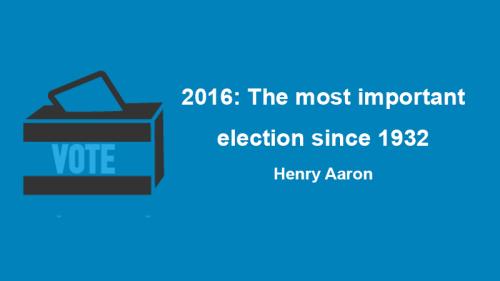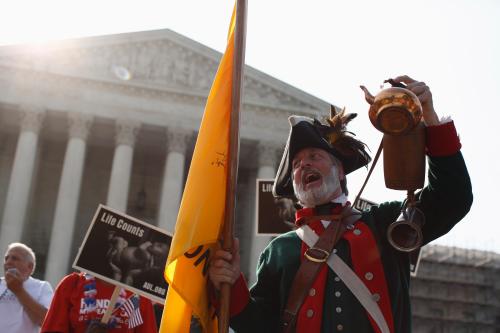Two years after the passage of the Patient Protection and Affordable Care Act, the country remains deeply divided over President Obama’s signature domestic policy achievement, and the debate over its constitutionality is headed for the Supreme Court in a highly anticipated case.
Which aspects of the law will be most heavily scrutinized? Is the court likely to rule that the individual mandate is unconstitutional? On March 21, Russell Wheeler took your questions in a live web chat with moderator Vivyan Tran of POLITICO.
12:30 Vivyan Tran: Welcome everyone, let’s get started!
12:31 Comment From Peter, CA: How receptive do you think the court is to hearing these arguments? Are there some justices who will prove more critical as “swing votes” than others?
12:32 Russell Wheeler: Well, it’s hearing the arguments. As swing votes, most think that Ginsburg, Breyer, Sotomayor and Kagan will uphold it, and Thomas won’t. That leaves the Chief Justice (CJ), Kennedy and Scalia. The most interesting is the CJ.
12:32 Comment From Fran E: On which aspects of the Affordable Care Act is the court set to hear challenges?
12:33 Russell Wheeler: Two provisions—the so-called individual mandate that almost all Americans buy some minimal form of health insurance or pay a penalty, and an expansion of the Medicaid rolls.
12:33 Comment From Anne: There was talk about televising the oral argument. Is that going to happen?
12:33 Russell Wheeler: Some thought this case was the poster child for televising arguments, but the court won’t allow it. It will post same-day audio of the oral arguments and written transcripts.
12:33 Comment From Bobbi: What happens next if the Supreme Court strikes down the individual mandate?
12:35 Russell Wheeler: If it invalidates the individual mandate, the next question is whether the rest of the law goes also. This is the “severability” question that the court will entertain on Tuesday. The government says even with an invalidation, most of the act can remain as good law.
12:35 Comment From Guest: What do you think about the decision to not allow television cameras in the court room?
12:36 Russell Wheeler: I think the court is passing up a great opportunity for public education, but that’s not the view of most of the Justices.
12:36 Comment From Jenny: What makes Roberts more interesting than the other swing votes?
12:38 Russell Wheeler: Two things. First, along with Alito, he has not encountered a question of economic regulation under the commerce clause, like this, while on the court. Second, though, as CJ he is probably more aware of the court’s institutional situation. He would know for sure that a 5-4 decision invalidating Obama’s signature domestic policy achievement, with all 5 Republican appointees voting to invalidate it—and in the middle of an election season—would damage the court’s prestige. That’s not to say he’ll vote to uphold the law regardless of his views, but as CJ he has to have an institutional perspective.
12:38 Comment From Karen K: What cases decided by lower courts is the Supreme Court likely to look at?
12:39 Russell Wheeler: It granted review in only one—the 11th Circuit Court of Appeals. But it asked for briefing on two questions not at issue there—whether the Act is ripe for review under the Anti-Injunction Act, and whether the Medicaid expansion is constitutional. The 11th Circuit said it was and no other court of appeals has disagreed. Usually it takes an intercircuit conflict to trigger Supreme Court review.
12:39 Comment From Mark, Greenbelt, MD: What specific issues will the court rule on? Could it rule some things constitutional, and other aspects not? Or is it all or nothing?
12:41 Russell Wheeler: There are four questions and it will hear arguments on them in turn. First, is the “penalty” for not buying insurance really a tax, and if so does the Anti-Injunction Act, which says a suit against a tax payment cannot be filed until the tax is due—in 2014, mean that the court can’t consider the case now? Second, is the individual mandate constitutional? Third, if it’s not, is it severable from the rest of the Act? Fourth, is the expansion of Medicaid eligibility—and the loss of all federal Medicaid payments to states that refuse to go along—an unconstitutional coercion?
12:41 Comment From Sally: What are your thoughts on the new solicitor general who will argue the case?
12:42 Russell Wheeler: He’s a highly respected veteran advocate, as is his main opponent, Paul Clement, the former solicitor general. It will be an awesome display of advocacy from these two and the others who will participate. Too bad only about 300 people will be able to see it.
12:42 Comment From Howard: Do you think the political debate is affecting the court? If so, how? If not, why not?
12:44 Russell Wheeler: To state the obvious, the Justices can’t be unaware of the context—a highly charged challenge to a very important statute in the middle of a presidential election, with the court’s standing with the public not at its highest, partly because of Citizens United. While the Justices are aware of those facts, they will not have a decisive influence on their votes. But I could see some pressure to avoid at least the 5-4 scenario I described earlier.
12:44 Comment From Jimmy: What happens in the Obama administration if the court strikes this down? Did Obama waste political capital on something that was unconstitutional?
12:46 Russell Wheeler: Good question. You can play out the options. Court strikes down the Act narrowly, and Obama et al. argue, there goes the activist Supreme Court again. Keep me in office because 4 of the justices are in their mid-70s and I need to make the appointments to any vacancies that occur. Republicans say—see we told you all along. We wasted a lot of legislative time on an act that was invalid. Or if the court upholds the act, there’s increased pressure to get a Republican Congress and White House that will overturn it.
12:47 Comment From Susan: It’s taken about two years for this challenge to reach the Supreme Court. Is this normal, or has this process been “fast tracked?”
12:48 Russell Wheeler: It’s been fast tracked to a degree. After the 11th Circuit 3-judge panel ruled the mandate unconstitutional, the administration could have requested a rehearing before the full appellate court, but it elected not to do so and go straight to the Supreme Court. But 2 years from signing to Supreme Court argument is not slow by any means.
12:48 Comment From R. Iglesias: How did this issue come before the court? What path did it take to get to this point? What have lower courts said?
12:49 Russell Wheeler: At least 4 appellate courts have considered challenges to the Act—the 11th Circuit (see above), the 6th and DC Circuits, which upheld it, and the 4th, which said the Act wasn’t ripe for review. The 6th and DC Circuit decisions are interesting because the opinions upholding the Act were, in both cases, written by highly respected but pretty conservative judges.
12:49 Comment From Tom: How is the mandate different than a requirement to buy car insurance to drive?
12:50 Russell Wheeler: The most obvious difference is that requirements for car insurance are exercises by the states of their police power. The federal government is one of enumerated powers, and opponents of the Act say those powers don’t include the power to tell someone to buy health insurance.
12:50 Comment From Katrina: Which states have been most aggressive in challenging the law?
12:51 Russell Wheeler: The case before the court has been joined by 26 states, all of them with Republican governors–led by Florida.
12:51 Comment From Leslie B: Do you think the court took up this case in an election year precisely because Roberts knew it was politically important? I don’t want to be cynical, but with the political system in the shape we see it today, I can’t help but wonder.
12:53 Russell Wheeler: I very much doubt it. The court is going to take a battering regardless of how it decides this case, and the battering will be all the more intense because of the election year. A recent Gallup poll reported that only 46% of respondents think the court is doing a good job, and I saw a Rasmussen poll the other day reporting that only 28% of respondents said the court’s performance was excellent or good. This decision—either way—probably won’t help those numbers.
12:53 Comment From Monique: On what basis is the Obama administration basing its defense of the ACA?
12:54 Russell Wheeler: Basically, that the Constitution’s grant of authority to Congress to regulate commerce among the states, and to take necessary and proper steps to achieve that regulation, authorized the individual mandate. They also argue that the taxing power justifies it, but that’s secondary.
12:54 Comment From Benjamin: Have any of the judges given any indication of how they are likely to vote on the main issues?
12:55 Russell Wheeler: Only what one can read from prior cases. On that basis, few think Thomas will side with the administration. Scalia, though, in 2005 joined an opinion upholding application of federal drug laws to marijuana that a California resident grew solely for her own use. In fact, he wrote a concurring opinion that the administration cites frequently in its briefs.
12:55 Comment From Charles: I’ve read there’s a power play around DC right now to get tickets to the proceedings. How does one get access to these tickets?
12:56 Russell Wheeler: News to me.
12:56 Comment From Brian: Based on your own “gut instinct,” do you see the justices striking down any/all of the ACA?
12:57 Russell Wheeler: I think the court is likely to find the case ripe and to uphold the individual mandate and the Medicaid expansion. But that’s iffy. Almost as important as whether it upholds the act is the division among the justices, and the nature of the majority opinion explaining the decision.
12:57 Comment From Dirk: How long will it take after the hearing until we get a decision?
12:58 Russell Wheeler: The court insists on announcing decisions in all cases in which it has heard oral arguments during the term (starting in October) before it goes on its summer recess. That means a decision probably in late June or the first days of July.
12:58 Comment From Blythe: Do you think Obama realized that the health care reform bill would eventually have to pass through the Supreme Court when he originally signed it into law? Or did he think the states would gradually just learn to live with it?
12:59 Russell Wheeler: When the law was signed, few thought anyone would take legal challenges to it too seriously. Bad estimate. But I suspect Obama, a constitutional law professor, knew that it was going to get a challenge, since the case raises fundamental questions about federal power and the need to regulate a large portion of the economy.
12:59 Russell Wheeler: Thanks for these great questions!
12:59 Vivyan Tran: Thanks for the questions. See you next week!



Commentary
Web Chat: Supreme Court to Hear Health Care Law Challenge
March 21, 2012